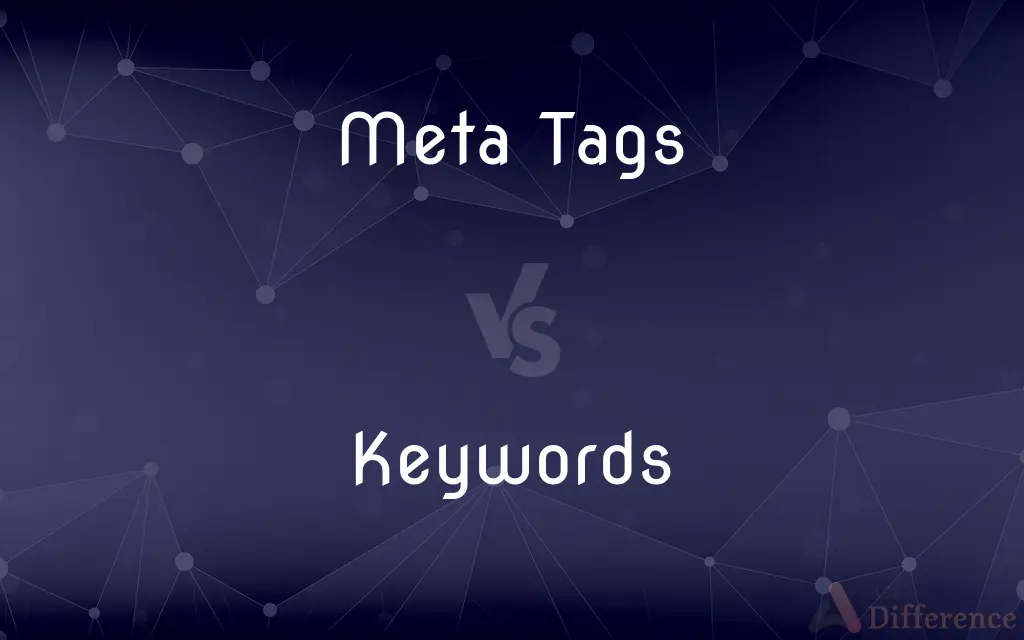Meta Tags vs. Keywords — What's the Difference?
By Tayyaba Rehman — Published on December 2, 2023
Meta Tags are HTML elements providing info about a webpage; Keywords are specific words central to a page’s content.

Difference Between Meta Tags and Keywords
Table of Contents
ADVERTISEMENT
Key Differences
Meta Tags are snippets of text that describe a webpage's content. They don't appear on the page itself but reside in the page's code. Keywords, in contrast, are the words and phrases that individuals type into search engines, directly correlating with the content visible on a webpage and guiding search engines on what the page is about.
Meta Tags serve a critical function in SEO by telling search engines what a webpage is about. Keywords, however, are utilized by web content creators to highlight the topics and areas they want their webpages to be associated with and found for in search engine results.
Meta Tags need to be strategically placed in the HTML of the website pages. Keywords, conversely, are placed directly within the content, ensuring they appear natural and relevant to the topic being discussed on the webpage.
Meta Tags can contain a variety of information, including the author of the page, how often it is updated, and what the page is about. Keywords form the essential basis of the content's subject matter and directly influence what search queries a page will show up for.
Meta Tags and Keywords must work in conjunction. While Meta Tags facilitate the accurate indexing of the webpage by search engines, Keywords enhance the page's visibility for those specific terms during a user's search query.
ADVERTISEMENT
Comparison Chart
Definition
HTML elements that provide data about a page.
Words/phrases describing content's focus.
Placement
In a page’s HTML code.
Within the website content.
SEO Role
Inform search engines about page content.
Influence search engine rankings.
Visibility
Not visible to website visitors.
Visible and central to content.
User Interaction
Indirect through search engine behavior.
Direct through search queries.
Compare with Definitions
Meta Tags
Meta Tags contain information like page description, keywords, and author.
The web developer included detailed Meta Tags to improve the site's SEO.
Keywords
Keywords are specific words or phrases that define a page’s content.
We chose our Keywords carefully to rank higher in search engine results.
Meta Tags
Meta Tags are invisible tags that provide information about a website.
Efficient SEO involves optimizing Meta Tags for improved website ranking.
Keywords
Keywords are terms that individuals use in search engines to find content.
The article contained all the Keywords users might use to find such content.
Meta Tags
Meta Tags are elements of HTML that provide metadata about a webpage.
The Meta Tags on our homepage ensure search engines understand our content's purpose.
Keywords
Keywords are utilized in advertising for targeting ads to relevant audiences.
Our ad campaign uses specific Keywords to ensure relevant visibility.
Meta Tags
Meta Tags help search engines identify what a page is about.
We updated our Meta Tags to reflect our new services.
Keywords
Keywords are central to SEO strategies, guiding search engine algorithms.
By analyzing popular searches, we selected effective Keywords for our campaign.
Meta Tags
Meta Tags are crucial for SEO as they affect how a website appears in search results.
By fine-tuning our Meta Tags, we enhanced our visibility on search engines.
Keywords
Keywords in content creation target specific market demographics.
We incorporated Keywords to attract the right audience to our website.
Keywords
A word that serves as a key to a code or cipher.
Keywords
A significant or descriptive word.
Keywords
A word used as a reference point for finding other words or information.
Keywords
Plural of keyword
Common Curiosities
Do Keywords need to be repeated multiple times in content?
Keywords should appear naturally within the content, avoiding "keyword stuffing," which can negatively impact SEO.
Are Meta Tags visible on the website?
No, Meta Tags are part of the HTML code and are not visible to the website's visitors.
How do Keywords function in SEO?
Keywords are vital in SEO, guiding search engines to rank webpages based on relevancy to user searches.
What are Meta Tags?
Meta Tags are HTML tags used in a webpage's code to provide information about that page to search engines.
How do I choose the right Keywords?
Research using tools like Google Keywords Planner, considering search volume and competition.
What's the difference between short-tail and long-tail Keywords?
Short-tail Keywords are more general, while long-tail Keywords are longer phrases with specific queries.
What information do Meta Tags contain?
Meta Tags can contain information about the webpage’s content, author, and refresh intervals.
Can Meta Tags be seen by users?
While not directly, users see Meta Tags' effects in search results through titles and descriptions.
What are LSI Keywords?
LSI (Latent Semantic Indexing) Keywords are semantically related terms that help search engines understand content context.
Are Meta Tags still important for SEO?
Yes, particularly the title and description tags, which influence click-through rates.
Do all Meta Tags impact SEO?
No, but some like title and description Meta Tags significantly impact search rankings.
What is the role of Meta Tags in social media sharing?
Special Meta Tags (like Open Graph for Facebook) determine how page information displays when shared on social media.
Should Keywords match search queries exactly?
Not necessarily; they should be relevant and natural, considering synonyms and user intent.
How many Meta Tags should a page have?
Focus on essential Meta Tags: title, description, and optionally, keywords for your content.
Are Keywords necessary in the URL?
Including Keywords in the URL can enhance SEO, but relevance and conciseness are key.
Share Your Discovery

Previous Comparison
Synchronous Motor vs. Asynchronous Motor
Next Comparison
Optimized vs. OptimisedAuthor Spotlight
Written by
Tayyaba RehmanTayyaba Rehman is a distinguished writer, currently serving as a primary contributor to askdifference.com. As a researcher in semantics and etymology, Tayyaba's passion for the complexity of languages and their distinctions has found a perfect home on the platform. Tayyaba delves into the intricacies of language, distinguishing between commonly confused words and phrases, thereby providing clarity for readers worldwide.
















































